List of landmarks
For consistency, the list below uses the name from the City of Cincinnati website.
Individual landmarks
| Local Historic Landmark [2] | Image | Location | Neighborhood | Ordinance | Designation date | Construction date or period | NRHP date [3] | NHL date |
|---|---|---|---|---|---|---|---|---|
| American Can Company |  | 4101 Spring Grove Ave. | Northside | 0309-2007 | August 1, 2007 | 1921 | October 17, 2007 | N/A |
| Baldwin Piano Building |  | 655 Eden Park Dr. | Walnut Hills | 0028-2015 | February 11, 2015 | 1921 | February 23, 2016 | N/A |
| Ben Pitman House |  | 1852 Columbia Pkwy. | East Walnut Hills | 0202-1974 | May 15, 1974 | July 7, 1969 | N/A | |
| Brunswick Balke Collender Building |  | 130-132 E 6th St. | CBD/Downtown | 0257-2016 | May 29, 2016 | January 24, 2017 | N/A | |
| Carthage Flagpole |  | 7011 Vine St. | Carthage | N/A | May 12, 1982 [4] | N/A | N/A | |
| Cincinnati Athletic Club Building |  | 111 Shillito Pl. | CBD/Downtown | 0248-1985 | May 30, 1985 | February 17, 1983 | N/A | |
| Cincinnati Bell Building | 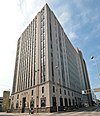 | 209 W 7th St. | CBD/Downtown/West End | 0452-1985 | September 18, 1985 | April 20, 1995 | N/A | |
| Cincinnati City Hall |  | 801 Plum St. | CBD/Downtown | 0199-1974 | May 28, 1974 | December 11, 1972 | N/A | |
| Cincinnati Union Terminal |  | 1301 Western Ave. | Queensgate | 0079-1974 | March 6, 1974 | 1933 | October 31, 1972 | May 5, 1977 |
| Citadel Building |  | 114-116 E 8th St. | CBD/Downtown | 0452-1985 | September 18, 1985 | N/A | N/A | |
| Court Street Fire Station |  | 315 W Court St. | CBD/Downtown | 0452-1985 | September 18, 1985 | N/A | ||
| Covenant-First Presbyterian Church | 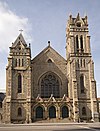 | 717 Elm St. | CBD/Downtown | 0249-1975 | May 14, 1975 | January 29, 1973 | N/A | |
| Cuvier Press Club |  | 22 Garfield Pl. | CBD/Downtown | 0216-1973 | May 16, 1973 | October 26, 1972 | N/A | |
| Doctor's Building |  | 19 Garfield Pl. | CBD/Downtown | 0452-1985 | September 18, 1985 | December 4, 1986 | N/A | |
| Duttenhofer Building |  | 299 E 6th St. | CBD/Downtown | 0021-2016 | January 27, 2016 | December 26, 2017 | N/A | |
| Farmers Hotel |  | 4000 Colerain Ave. | Northside | 0260-2013 | August 7, 2013 | N/A | N/A | |
| First National Bank Building | 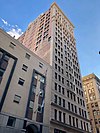 | 105 E Fourth St. | CBD/Downtown | 0134-2016 | May 2, 2016 | January 24, 2017 | N/A | |
| George Pendleton House |  | 559 Liberty Hill | Mount Auburn | 0201-1974 | May 15, 1974 | October 15, 1966 | January 29, 1964 | |
| Harriet Beecher Stowe House |  | 2950 Gilbert Ave. | Walnut Hills | 0200-1974 | May 15, 1974 | November 10, 1970 | N/A | |
| Henry Probasco House |  | 430 W Cliff Ln. | Clifton | 0215-1973 | May 16, 1973 | November 9, 1972 | N/A | |
| Holy Cross Monastery |  | 1055 St. Paul Pl. | Mount Adams | 0443-1981 | October 14, 1981 | September 13, 1978 | N/A | |
| House of Adam |  | 620-622 Vine St. | CBD/Downtown | 0314-2016 | September 28, 2016 | N/A | N/A | |
| King Records |  | 1540 Brewster Ave. | Evanston | 0319-2015 | October 7, 2015 | N/A | N/A | |
| Kinsey Apartment Building |  | 2415 Maplewood Rd. | Mount Auburn | 0066-2013 | March 27, 2013 | N/A | N/A | |
| Kirby Road School |  | 1710 Bruce Ave. | Northside | 0044-2013 | April 10, 2013 | September 3, 2013 | N/A | |
| Krippendorf-Dittman Building |  | 628 Sycamore St. | CBD/Downtown | 0452-1985 | September 18, 1985 | March 3, 1980 | N/A | |
| Laurel Court |  | 5870 Belmont Ave. | College Hill | 0199-1979 | May 16, 1979 | November 29, 1979 | N/A | |
| Masonic Temple |  | 3301 Price Ave. | East Price Hill | 0257-2013 | July 11, 2013 | N/A | ||
| Moore-Knight House | Upload image | 716 Mt. Hope Ave. | East Price Hill | 0308-1994 | August 3, 1994 | N/A | N/A | |
| Music Hall |  | 1243 Elm St. | Over-the-Rhine | 0214-1973 | May 29, 1973 | 1878 | January 26, 1970 | December 2, 1974 |
| Plum Street Temple |  | 720 Plum St. | CBD/Downtown/West End | 0250-1975 | May 14, 1975 | December 27, 1972 | May 15, 1975 | |
| Provident Bank Building |  | 632 Vine St. | CBD/Downtown | 0452-1985 | September 18, 1985 | September 6, 2018 | N/A | |
| Reakirt Building |  | 126-128 E 6th St. | CBD/Downtown/West End | 0256-2016 | June 29, 2016 | January 24, 2017 | N/A | |
| Riverview Playground Entrance |  | 900 Adams Crossing | East End | 0452-1985 | September 18, 1985 | N/A | N/A | |
| Sayler Park Indian Statue | Upload image | Gracely Dr. and Thornton Ave. | Sayler Park | N/A | N/A | N/A | N/A | |
| St. Louis Church |  | 29 E 8th St. | CBD/Downtown | 0452-1985 | September 18, 1985 | N/A | N/A | |
| St. Francis Desales Church | 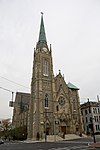 | 1600 Madison Rd. | East Walnut Hills | 0221-1983 | May 18, 1983 | March 1, 1974 | N/A | |
| St. Francis Xavier Church | 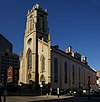 | 607 Sycamore St. | CBD/Downtown | 0249-1985 | May 30, 1985 | July 18, 1980 | N/A | |
| St. Peter-in-Chains Cathedral | 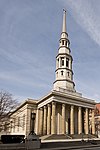 | 325 W 8th St. | CBD/Downtown/West End | 0251-1975 | May 14, 1975 | January 18, 1973 | N/A | |
| Traction Building |  | 432 Walnut St. | CBD/Downtown | 0302-2016 | September 14, 2016 | July 3, 2017 | N/A | |
| Tyler-Davidson Fountain |  | Vine St. and E 5th St. | CBD/Downtown | 0452-1985 | September 18, 1985 | October 11, 1979 | N/A | |
| Underwriter's Salvage Corps | 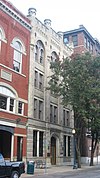 | 110-112 E. 8th St. | CBD/Downtown | 0452-1985 | September 18, 1985 | July 15, 1982 | N/A | |
| Union Central Life Annex Building |  | 309 Vine St. | CBD/Downtown | 0029-2015 | February 11, 2015 | N/A | N/A | |
| Williams YMCA |  | 1228 E McMillan St. | Walnut Hills/East Walnut Hills | 0252-2016 | May 29, 2016 | N/A | N/A | |
| Windsor School |  | 937 Windsor St. | Walnut Hills | 0045-2014 | March 26, 2014 | N/A | N/A | |
| Former WLWT studio (also known as Crosley Square) |  | 140 W 9th St. | CBD/Downtown | 0452-1985 | September 18, 1985 | N/A | N/A |
Historic Districts
For consistency, the list below uses the name from the City of Cincinnati website: [5]
- Auburn Avenue Historic District (Mount Auburn)
- Betts–Longworth Historic District (West End)
- Cleinview-Hackberry Historic District (East Walnut Hills)
- College Hill Historic District (College Hill)
- Columbia Tusculum Historic District (Columbia-Tusculum)
- Court Street Historic District (CBD/Downtown)
- Dayton Street Historic District (West End)
- East Walnut Hills Historic District (East Walnut Hills)
- Holy Cross Monastery and Chapel Historic Site and Structure (Mount Adams)
- Hyde Park Observatory Historic District (Hyde Park)
- Lincoln-Melrose Historic District (Walnut Hills)
- Lytle Park Historic District (CBD/Downtown)
- Main Street Historic District (CBD/Downtown)
- Mohawk-Bellevue NBD Historic District (Over-the-Rhine)
- Ninth Street Historic District (CBD/Downtown)
- Northside NBD Historic District (Northside)
- Old Bond Hill Historic District (Bond Hill)
- Over-the-Rhine Historic District (Over-the-Rhine)
- Prospect Hill Historic District (Prospect Hill)
- Sacred Heart Academy Mt Storm Historic District (Clifton)
- Sohn-Mohawk Historic District (Over-the-Rhine)
- Third Main Street Historic District (CBD/Downtown)
- Uplands Historic District (East Walnut Hills)
- West Fourth Street Historic District (CBD/Downtown)
- Woodburn Avenue NBD Historic District (Woodburn)
